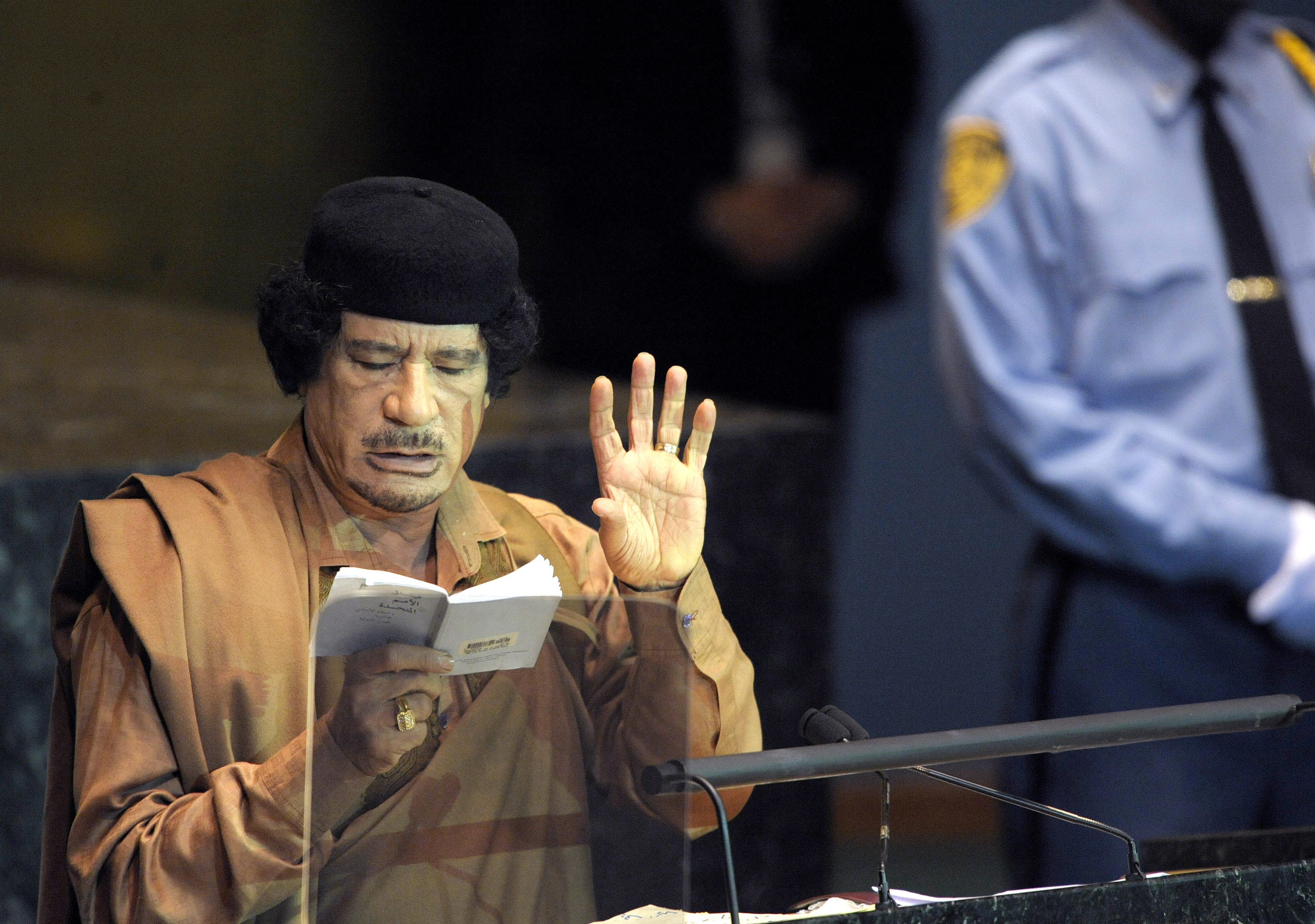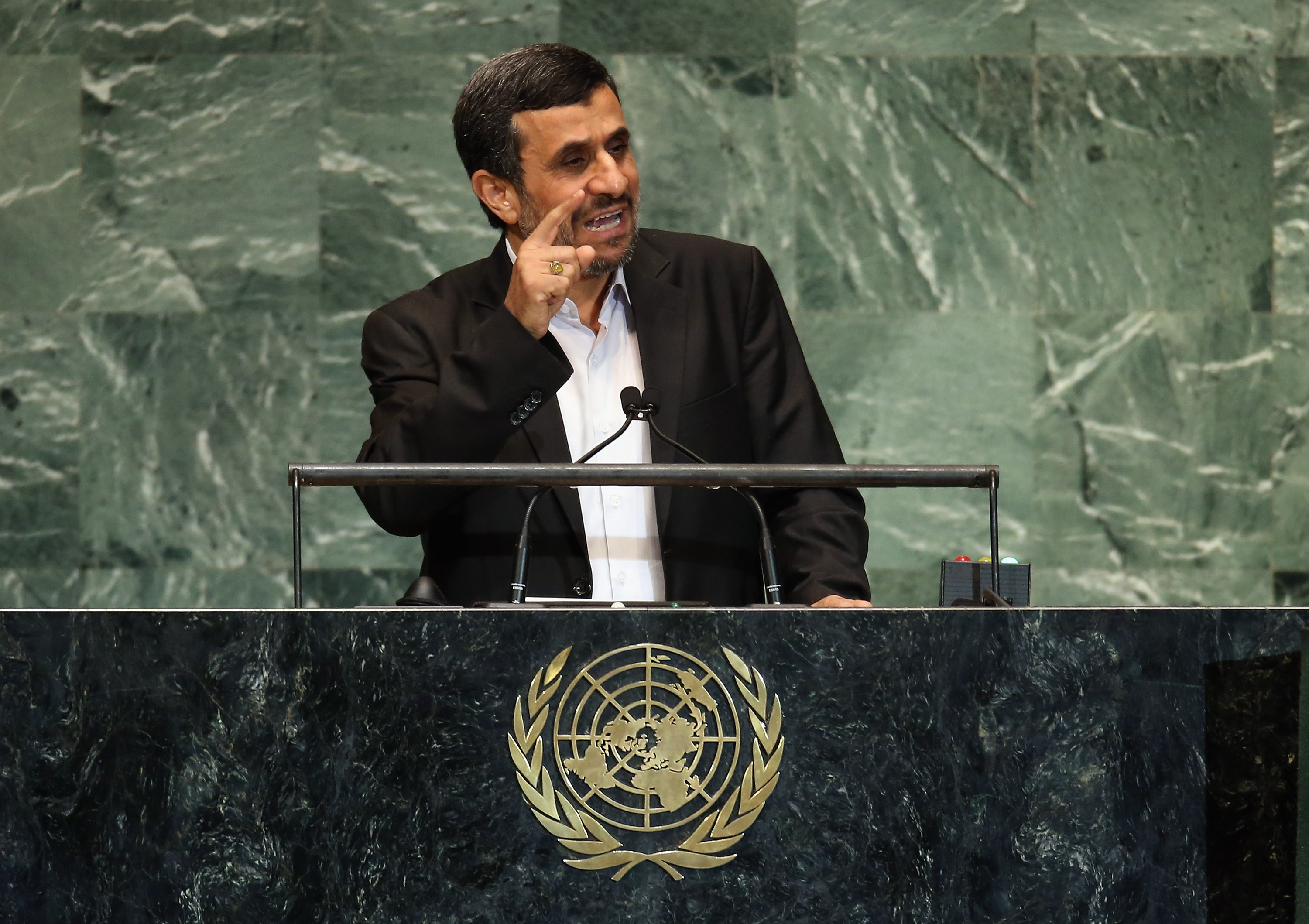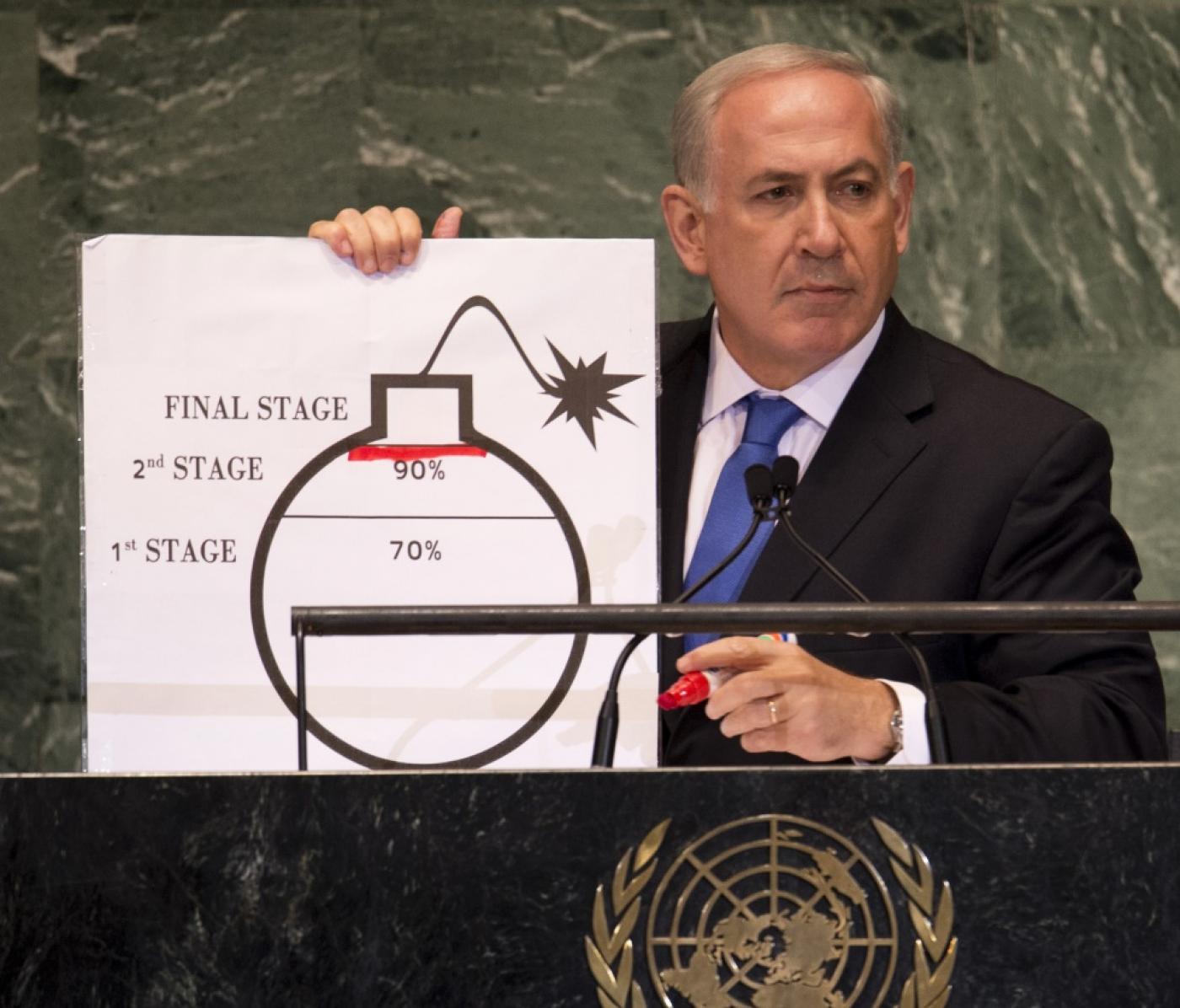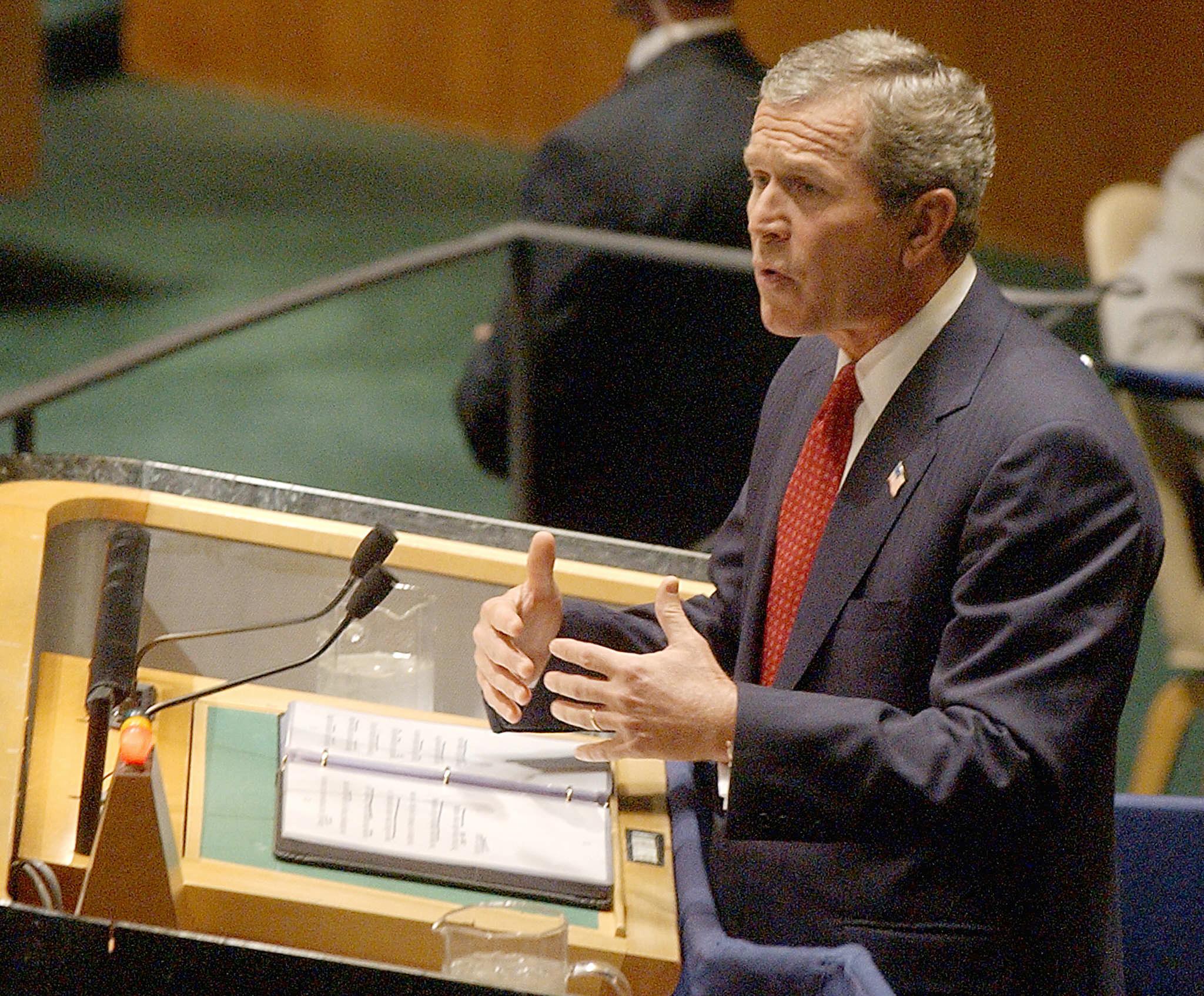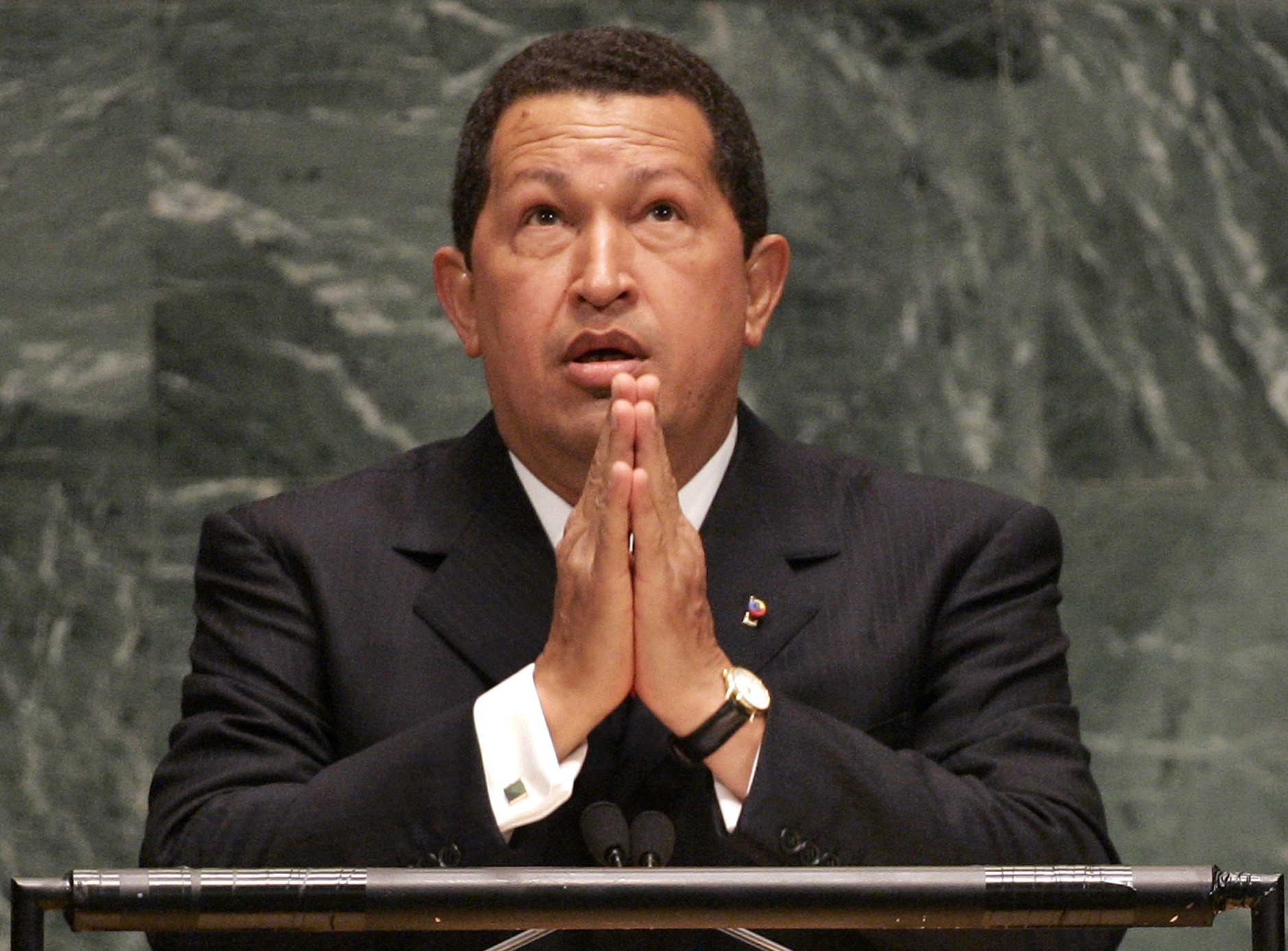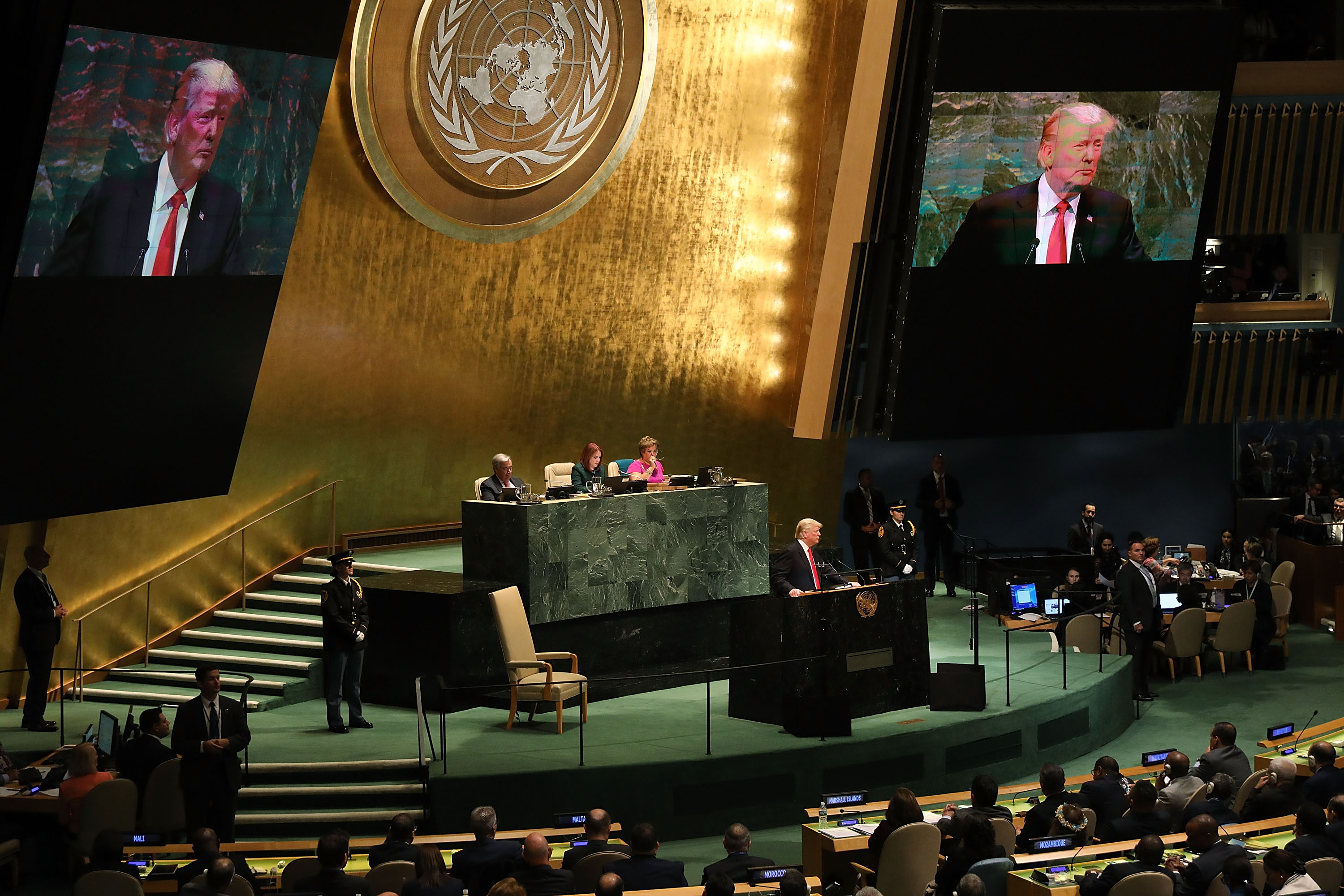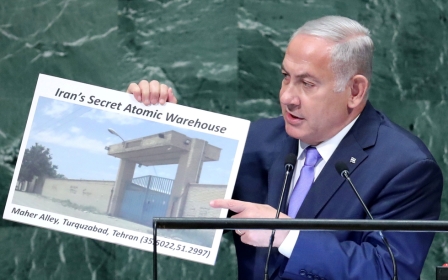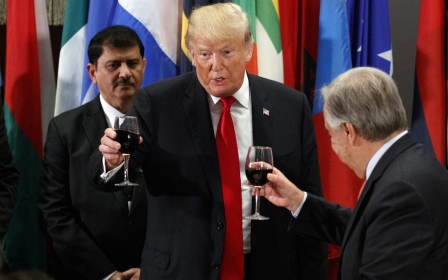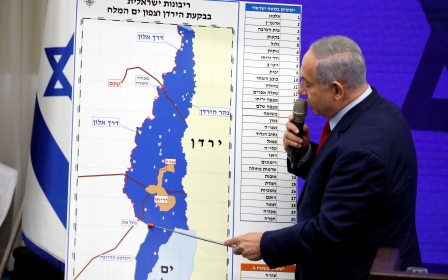
Six memorable Middle East moments from the UN General Assembly
In the Syrian play Cheers to the Homeland, the drunken main character Ghawar tells his father's ghost that the Arab World is splintering further "to increase our votes at the United Nations [General] Assembly".
The joke lamented the lack of unity of Arab states - and the fact that even with more votes, resolutions at the UN General Assembly are non-binding.
Yet despite its limited power, the UN annual summit continues to bring together the leaders of the world's 193 internationally recognised states, making it the most inclusive branch of the UN.
And its annual meetings have been the setting for historic - and sometimes historically comical - moments.
As world leaders gather again in New York City for the UN General Assembly this week, MEE revisits six key moments that took place behind the UN podium.
1. Libya's Muammar Gaddafi speaks for 100 minutes
In his first and only speech at the UN, the late Libyan leader Muammar Gaddafi made up for lost time.
Gaddafi shattered the UN's time limit of 15 minutes in 2009 when he delivered a 100-minute tirade in which he denounced the UN Security Council, defended Somali pirates and accused "capitalist companies" of producing viruses to sell medicine.
Gaddafi also called on the UN to open an investigative division to look into the assassinations of historical figures, including Congolese independence leader Patrice Lumumba, US President John F Kennedy and American civil rights icon Martin Luther King Jr.
The Libyan leader went on to promote a one-state solution for the Israeli-Palestinian conflict - an idea he had outlined in a 2000 manifesto known as the White Book.
"This conflict poisons the world. The White Book actually has the solution; I hold it here," said Gaddafi, brandishing the book before tossing it in the direction of then-UN Secretary General Ban Ki-Moon. "The solution is Isratine. Arabs have no hostility or animosity towards Israel."
There was plenty of criticism to go around in the speech, but the colonel reserved his harshest words for the UN Security Council, blaming it for dozens of wars that killed millions of people.
Gaddafi said the council was tyrannical in nature because it gives five veto-holding countries oversized influence over global affairs. The Libyan leader also suggested transferring the Security Council's powers to the more inclusive General Assembly.
"At present, the Security Council is security feudalism, political feudalism for those who have permanent seats... It should not be called the Security Council; it should be called the terror council," Gaddafi said.
During his stay in New York, Gaddafi erected his infamous tent - in which he would stay with his all-female security detail - on a property owned by Donald Trump in the suburb of Bedford. But after the speech, Trump, then a New York businessman, asked the Libyan leader to leave his estate. Gaddafi also had a request to pitch his tent in New York's Central Park denied.
2. Diplomats walk out on Iran's Mahmoud Ahmadinejad
Over his eight years as Iran's president, Mahmoud Ahmadinejad was at the centre of several controversies that grabbed international headlines. His maiden UN address in 2005 was no different, with Ahmadinejad stressing that all nations, including Iran, have a right to nuclear energy.
"We believe that all countries and nations are entitled to technological and scientific advancement in all fields, particularly the peaceful technology to produce nuclear fuel," he said at the time. "Such access cannot be restricted to a few."
The 2005 speech set a defiant tone that would become characteristic of the Iranian president's UN General Assembly appearances, which sparked walkouts on two occasions.
While his speeches were critical of global economic inequality and promoted Iran as a real democracy, in 2007 Ahmedinejad prompted global condemnation for questioning what happened during the Holocaust and casting doubt over the US account of the 9/11 attacks.
Speaking at New York's Columbia University on the sidelines of the UN General Assembly that year, the Iranian president raised questions about the Nazis' mass extermination campaign that targeted the Jewish people and left six million people dead during World War II.
"I am not saying that it didn't happen at all," he said. "This is not the judgment that I am passing here. Granted this happened, what does it have to do with the Palestinian people?"
In the same speech, Ahmedinejad became the subject of ridicule for saying that there are no gay people in Iran. And during his time in New York, he was barred from laying a wreath at Ground Zero, the site of the World Trade Center building that was destroyed during the 9/11 attacks.
In 2010, European and American diplomats walked out during Ahmedinejad's UN speech, after he floated a conspiracy theory that "some segments within the US government orchestrated the [9/11] attack".
A year later, delegates walked out again when the Iranian leader repeated his scepticism about 9/11 and the Holocaust. "By using their imperialistic media network, which is under the influence of colonialism, they threaten anyone who questions the Holocaust and the September 11 event with sanctions and military actions," Ahmadinejad said at the time.
3. Benjamin Netanyahu's red marker
On the UN General Assembly stage in 2012, Israeli Prime Minister Benjamin Netanyahu drew a literal red line on Iran's nuclear programme - with a marker.
Holding a poster displaying a cartoon bomb with a fuse, Netanyahu said Tehran could be months - if not weeks - away from building a nuclear weapon should it be allowed to continue uranium enrichment.
"The red line should be drawn right here," said Netanyahu, his marker screeching as he dragged it back and forth near a line marked 90 percent, "before Iran completes the second stage of nuclear enrichment necessary to make a bomb - before Iran gets to a point where it's a few months away or a few weeks away from amassing enough enriched uranium to make a nuclear weapon."
Netanyahu's theatrics were also seen as a critique of then-US President Barack Obama, who had refused to set a red line on Iran's nuclear programme that would lead to military strikes.
To the Israeli leader's dismay, three years later, Obama and multiple other world leaders signed an agreement with Iran to restrict the country's nuclear programme in exchange for lifting international sanctions against its economy. Donald Trump pulled the US out of the agreement in May 2018, but Netanyahu has continued to ring alarm bells about Iran's nuclear programme.
Earlier this month, Netanyahu accused Iran of razing a nuclear site where he said Tehran had been building an atomic weapon - and he once again used visual props to make his point.
"In this site, Iran conducted experiments to develop nuclear weapons," Netanyahu said in a televised speech, standing in front of a projected grainy photo of buildings surrounded by hills.
Netanyahu - and his posters - will not make it to the assembly this year; he cancelled his trip to New York to oversee the political impasse that followed the Israeli elections, which did not produce a clear winner for the country's premiership.
4. George W Bush tries to sell the war in Iraq
In 2002, one day after the first anniversary of the 9/11 attacks in New York, then-President George W Bush dedicated most of his address at the UN General Assembly to berating Iraq. Emphasising what turned out to be lies about Saddam Hussein's arsenal of weapons of mass destruction and ties to al-Qaeda, the US president urged other countries to "stand up" for global security.
He warned that failure to act against Hussein would lead to "far greater horrors" than 9/11, as he accused Baghdad of developing "terrible weapons" that it may supply to its "terrorist allies". Bush went so far as to say that Iraq is not far from being able to build a nuclear bomb.
"Iraq employs capable nuclear scientists and technicians. It retains physical infrastructure needed to build a nuclear weapon," Bush said. "Iraq has made several attempts to buy high-strength aluminum tubes used to enrich uranium for a nuclear weapon. Should Iraq acquire fissile material, it would be able to build a nuclear weapon within a year."
In his quest to denounce Hussein, Bush also cited Iraq's US-backed war with Iran in the 1980s as one of the many conflicts started by the Iraqi leader.
Less than a year later, the US-led invasion of Iraq began, Hussein was toppled, and his statue in Baghdad's Firdos Square was destroyed after US troops covered it with an American flag. But with widespread sectarian bloodshed, rampant corruption and the rise of militants, including the Islamic State (IS) group, Iraq's post-Hussein future was far from the rosy picture Bush envisioned in his 2002 speech.
"If we meet our responsibilities, if we overcome this danger, we can arrive at a very different future. The people of Iraq can shake off their captivity... inspiring reforms throughout the Muslim world," Bush said at the time.
5. Chavez bemoans 'the devil' for destruction in Middle East
When the late Venezuelan President Hugo Chavez took the UN stage in 2006, he spoke of a lingering smell of sulphur from "the devil" who had been at the same podium a day earlier.
It was not Lucifer nor any other fallen angel; rather, Chavez, a critic of Israel who aligned himself with the government of Cuba and Iran, was referring to the US president at the time - George W Bush.
"Yesterday, the devil came here, right here, right here," Chavez said, drawing a cross on his chest then joining his hands in prayer. "And it smells of sulphur still today, this table that I am now standing in front of."
Chavez went on to admonish US foreign policy, accusing Bush of talking "as the owner of the world" in an attempt to consolidate a global dictatorship.
He zeroed in on the US's policies in Palestine, Iraq and Lebanon, in particular. Only weeks before his address, the Israeli army launched a military assault on Lebanon that in just over a month left more than 1,000 civilians dead, ravaged villages and destroyed key infrastructure.
"The government of the United States doesn't want peace. It wants to exploit its system of exploitation, of pillage, of hegemony through war. It wants peace, but what's happening in Iraq? What happened in Lebanon? Palestine? What's happening?" Chavez said at the UNGA podium that September.
"What's happened over the last 100 years in Latin America and in the world? And now threatening Venezuela. New threats against Venezuela, against Iran."
6. The world laughs at Trump - and he attacks Iran
At the UN, leaders often call for cooperation and the end of conflicts, address global problems, or talk up their nation's role in the world. But in the opening remarks of his second address to the world body in 2018, Donald Trump found it fit to promote his own domestic achievements in typical superlative fashion.
"In less than two years, my administration has accomplished more than almost any administration in the history of our country. America's - so true," Trump said, prompting laughter from the heads of state and diplomats who filled the room.
The US president then chuckled. "I did not expect that reaction, but that is ok," he said, prompting even more laughter.
Trump would go on to rage against globalism and emphasise his "America first" worldview, which critics say underpins the White House's reluctance to call out human rights abuses around the world. "America is governed by Americans. We reject the ideology of globalism, and we embrace the doctrine of patriotism," Trump said.
Despite stressing a version of global politics in which states are free to pursue their own interests and handle their internal affairs without international interference, Trump freely criticised Iran, calling it a "dictatorship".
"The Iranian people are rightly outraged that their leaders have embezzled billions of dollars from Iran's treasury, seized valuable portions of the economy, and looted the people's religious endowments, all to line their own pockets and send their proxies to wage war," he said.
This article is available in French on Middle East Eye French edition.
Middle East Eye propose une couverture et une analyse indépendantes et incomparables du Moyen-Orient, de l’Afrique du Nord et d’autres régions du monde. Pour en savoir plus sur la reprise de ce contenu et les frais qui s’appliquent, veuillez remplir ce formulaire [en anglais]. Pour en savoir plus sur MEE, cliquez ici [en anglais].


